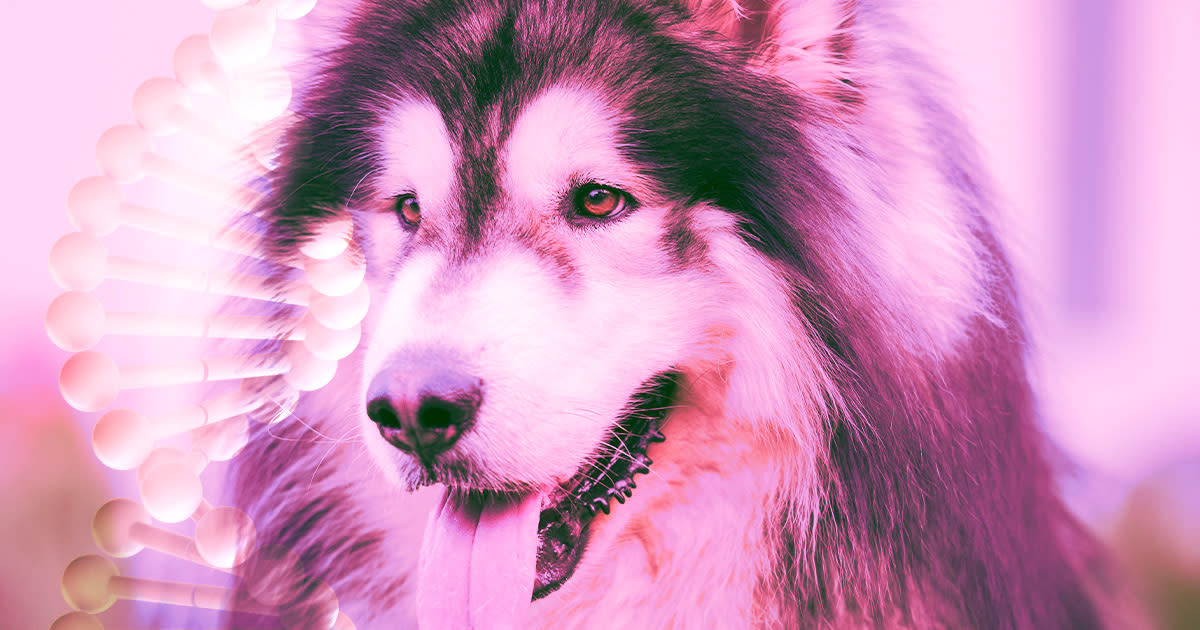Dog DNA Company Insists Human DNA Is Actually Alaskan Malamute

An at-home DNA testing kit for dogs claimed that human saliva returned various dog breed results — and when pressed, the firm held firm.
As Boston's WBZ-TV reports, the Toronto-based DNA My Dog company told not one but two humans who sent cheek swabs in that their results contained dog DNA, calling into question the accuracy of its tests.
The dog DNA debacle began last fall, when the local broadcaster reported that a New Hampshire woman decided to do an informal experiment, sending in a sample from her own cheek saliva without telling the company just to see what would happen. The company claims it sequenced her genome and found that she was 28 percent bulldog, 40 percent border collie, and 32 percent cane corso.
When asked about the results, a DNA My Dog representative told WBZ-TV that one of the woman's two cheek swabs contained canine DNA — an eyebrow-raising claim — and the breakdown it supplied her with "would not be possible on a human sample."
To get to the bottom of the strange case of the woman with alleged dog DNA in her cheeks, the broadcaster decided to send in samples from one of its own human reporters to multiple companies including DNA My Dog. Although the others said there wasn't enough canine DNA to test, the Toronto-based firm had no problem sequencing the reporter's genome and supplying her employer with her breed results: 40 percent Alaskan Malamute, 35 percent shar-pei, and 25 percent labrador.
DNA My Dog failed to respond to WBZ's several entreaties. When Futurism reached out to DNA My Dog, however, the company offered a lengthy and sometimes confusing explanation.
"If non-canine DNA is provided on a sample, our algorithms will automatically report a 100% genetic mismatch," a spokesperson said in an emailed statement, "and may randomly associate the genetic sequences with canine ones, usually those found in our positive control samples."
"The sample from the first test this team submitted to us failed our analysis and a re-test was performed. This sample was indeed non-canine DNA," the emailed statement said, seeming to reference the cheek swabs submitted by the New Hampshire woman last year. "The second sample submitted yielded a strong genetic match to canine breed markers, indicating that this sample was, in fact, a canine DNA sample. We assume that this is why they submitted more samples."
"It should be noted that our Canine DNA Test was not designed to determine the species present in DNA, but rather what breeds are present in a canine’s DNA," the statement continues. "Our test is designed to measure canine DNA specifically, not DNA from humans nor any other species. These non-canine samples have absolutely no bearing on the accuracy of our canine breed identification testing, and to say so would be a false equivalency."
DNA My Dog added that since "the airing of the first media report about this, we have been inundated with non-canine DNA sample submissions, whether from this team or unrelated parties."
"It is unfortunate that the accuracy of our canine DNA test has been called into question over the repeated submission of human DNA samples," the company said.
Back in September, when the news station first reported on DNA My Dog's defiant mixup, Harvard Medical School bioethicist and veterinarian Lisa Moses explained that testing dog DNA is particularly difficult because there aren't any genetic codes ascribed to breeds.
"A breed is something that we've decided, which is based upon essentially the way a dog looks," Moses told the CBS affiliate. "But that doesn't necessarily mean that we're going to know what their genes look like."
With issues abounding in the human DNA space — and, of course, the prevailing view that race and ethnicity are social and cultural constructs — it's no wonder that things get even fuzzier with dogs.
More on DNA tests: 23andMe CEO Says Company Is Doing Fine Despite Losing 93% of Stock Value

 Yahoo News
Yahoo News 
